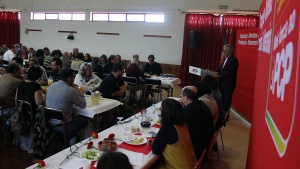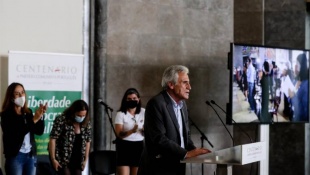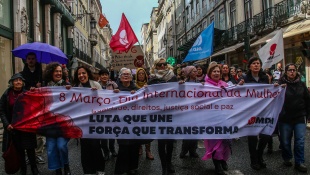Speech by Jerónimo de Sousa, Secretary General, Moita Town Hall Cell Lunch, honoring International Women's Day
Moita. March 8th, 2017
On this particular date, the PCP addresses women in a new policy framework where no effort has been spared to implement measures that pave the way to improving living and working conditions, as well as to the replacement of salary and rights. We value the advances made and their meaning in women’s lives.
Although still limited, the intervention of the PCP was decisive: the replacement of 35 working hours in the Public Administration; the replacement of holidays; the elimination of cuts in wages and the IRS addition; the increase in pensions; the extension and rise of the value of the family allowance; the full replacement, starting in 2018, of the Christmas allowance for pensioners and public administration workers; and the extension of free textbooks.
It assumes a particular importance and meaning the elimination of the measures imposed by the PSD/CDS on coercion and conditioning of women in access to the Volunteer Interruption of Pregnancy, subverting the law approved on 7th March 2007, which resulted from a extended struggle of women and the PCP against clandestine abortion in Portugal.
The degree of attack by right-wing policy, particularly between 2010 and 2015, with special responsibility of the former PSD/CDS government, requires a path of struggle to achieve new advances that will restore rights and income, raise the living and working conditions of workers and the people of which women are an integral part. Portuguese women, particularly women workers in all sectors of activity, both in the public and private sectors, face serious problems in their daily life, with social inequalities that are a clear violation of their labor and social rights, and persistence of specific discrimination, in particular as regards maternity and wages.
A reality that is not new but has had a deep aggravation until 2015, in direct relation to the policy of exploitation and impoverishment imposed on the country. In those years, all inequalities and discrimination were deepened, particularly in relation to workers, children and young people, pensioners and the vast majority of the population. All inequalities have extended, depending on the social origin, the level of income, the region where one lives and works. Discrimination at work was expanded on women, young people, and people with disabilities, among others.
The framework shows that equality is far from being a reality in women’s lives. It is true that Portuguese women have an increasing weight in various fields. They correspond to 48.8% of the working population, 51.3% of them are employed, being one million and 700 thousand in the tertiary sector, 107 thousand in the primary sector and 339 thousand in the secondary sector. In the public administration, in every 10 workers, 6 are women, one in five women have completed higher education, just to name some examples. 43 years ago it was not like that.
This is a reality that results from the April Revolution, which brought freedom and democracy, the right to organize and participate, the consecration of rights for women in law and in life. But the truth is that equality is far from being a reality in life for the overwhelming majority of Portuguese women.
Also far is the implementation of policies that are capable of enhancing the participation of women, putting them at the service of their own rights, increasing their knowledge training and experience, at the service of equal participation in the development of the country.
Many situations of inequality and discrimination remain because they are not properly detected and not signed, needing to be brought to light. Discrimination has already been identified but it is minimized in the face of the proliferation of many other forms of discrimination affecting workers and the people.
The low wages for all the workers are aggravated. One in every three women, at full time work, is paid the national minimum wage. The asymmetries between women and men, in terms of monthly earnings, increase the higher the professional category is, standing at 28% in senior management, in detriment of women. Precariousness and unemployment weigh heavily on working women and men.
The devaluation of the professional social status of women workers is deepening, inseparable from the increase in the exploitation of all Portuguese workers.
The demands of the present time impose on one hand, a strong impetus for their struggle regarding their own rights, for the recognition of equality in life, and on the other hand, a strong participation of women in the struggle for the consummation of common demands between workers and the people. The Democratic Movement of Women decided to celebrate International Women’s Day with an expressive street/mass initiative observing the following objectives: give voice to the problems of women and to demand a policy that accomplishes equality.
There are strong reasons for Portuguese women to participate in the National Women’s demonstration promoted by the DMW, next Saturday, 11thMarch, at 2:30 p.m. in Rossio, with the motto “Women’s voice for equality, rights, development and peace”.
As stated in the DMW Manifesto, there is no equality without social justice, without the participation of women in economic, social, political, cultural and sporting life, there is no equality without the development of the country, without combating violence on women which violates their rights, because there is no equality without defending peace in respect for international law. Predictably, the mainstream media have silenced it.
Communist women will not fail to spread out the word and mobilize other women to participate in this National Manifestation of Women so that it will become the greatest action of the feminine masses held in the last decades for the demand of a true policy that concretizes equality. We affirm that it is not possible to respond to the nuclear problems that obstruct women’s right to equality, without responding to the country’s economic and social problems, and without ensuring national sovereignty. The PCP does not agree with a “make-believe” equality based on social retrogression.
True equality is based on respect for the rights and the social progress of a sovereign country. It does not cope with attempts to conceal the responsibilities of right-wing policy in the persistence of inequalities and discrimination against women, and with the acts aimed at isolating the struggle of women for their own rights, and the more general struggle of workers and people towards a new course for the country.
Women know that they can rely in the PCP as their most faithful and coherent ally in the struggle to solve their most immediate and urgent problems, for the confidence and support given on the value of their everyday struggle in workplaces, in the countryside, in the neighborhoods, in the parishes, in the municipalities, as protagonists of the necessary changes in their lives and in the life of the country. We can state to Portuguese women that the PCP is their Party, the Women’s Emancipation Portuguese Party. Emancipation of women means equality regarding men, in the sphere of economic, political and social life impossible to achieve in capitalism.
It is true that the emancipation of women and of equality of rights between men and women is also a moral issue that demands the fight against prejudices and retrograde conceptions about the role of women in society. But without freedom from exploitation, without the achievement of economic independence, without the exercise of freedoms and guarantees, one cannot speak of the emancipation of women.
Only struggle is the way!




